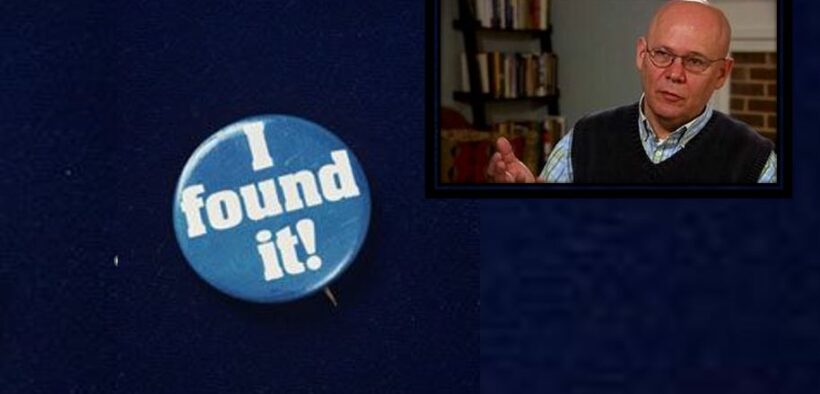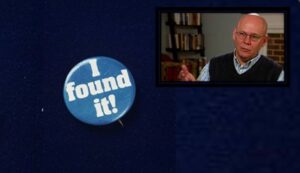EDITOR’S NOTEBOOK: A Church Owns Its Past, and Remembering The “I Found It” Campaign

Editor’s Note: Most Saturdays we will feature this “Editor’s Notebook” column. MinistryWatch President Warren Smith will comment on one or more stories in the week’s news, adding an additional perspective or, sometimes, a behind-the-scenes look at how the story came to be.

Not Something You See That Often. A Mississippi church, Broadmoor Baptist Church, recently announced that its former youth pastor participated in an abusive sexual relationship with a minor in the 1980s. It made the disclosures in a detailed account published on their website. According to the report, the pastor later paid for the victim’s therapy after she signed a non-disclosure agreement.
The victim claimed that former youth pastor David Ingram began grooming her when she was 12 years of age for a sexual relationship that started when she was 15 and continued while he was the youth pastor at Broadmoor Baptist.
The church published the allegations under a link titled “A Statement About Our Past” on its website. In the disclosure, the church shared that upon investigating, they heard consistent accounts verifying the victim’s disclosures and trauma care, including testimony from three of her counselors, and believed them to be true.
I should add that David Ingram, the alleged abuser, has remained in ministry for more than 40 years, and is currently pastor of a church less than an hour away from Broadmoor Baptist Church.
It’s extremely rare for a church to make such disclosures, and especially rare that it took these extraordinary steps to support the survivor. Sometimes you will have institutions issue statements expressing regret for incidents in its past. We saw that with the Catholic Church, the Boy Scouts, and other organizations. But the legal and financial risk of making such a statement is significant, and most individuals and churches remain silent. The fact that Broadmoor Baptist Church has taken this step seems new and different to me. What will truly make it significant will be if other churches follow suit.
Broadmoor also said it plans to engage an independent, third-party firm to investigate the allegations.
Access to MinistryWatch content is free. However, we hope you will support our work with your prayers and financial gifts. To make a donation, click here.
I (Haven’t) Found It. Back in 1976, Cru – then called Campus Crusade for Christ – launched the “I Found It” evangelism campaign. Bumper stickers and billboards with the “I Found It” message were everywhere. These messages were quickly followed up with evangelistic tracts that said, “Here’s How You Can Find It, Too.”
The indefinite “it” turned out to cause confusion. Jesus, after all, is a “he,” not an “it.” Cru subsequently defined the “it” as new life in Christ.
But not before the “it” and the campaign inspired parodies. “I Lost It” bumper stickers started showing up. I even remember an “I Smoked It” sticker.
But it also mobilized thousands of churches to engage in evangelistic efforts. I have never encountered anyone who came to Christ as a result of this campaign, though I do not doubt some did. (If you are one of them, I’d love to hear from you. Email me at [email protected].) I have met many people who say that participating in the effort was a defining moment in their spiritual growth. (You can watch a video about one man’s participation in the campaign here.)
A 21st century version of the “I Found It” campaign is underway. Launched earlier this year, the “He Gets Us” campaign, which features black-and-white online videos about Jesus as a rebel, an activist or a host of a dinner party, has had more than 300 million views, according to organizers.
MinistryWatch has written about this campaign in the past, and we’ve talked about it here on the podcast. But I wanted to dig into the numbers a bit. The campaign’s funding is managed by, the Signatry, a Christian foundation based in Kansas that helps manage philanthropic affairs for members of Hobby Lobby’s Green family.
But the structure of the He Gets Us campaign is complicated. He Gets Us is incorporated as He Gets Us, LLC, a single member LLC. Servant Foundation (which is tax-exempt) is the sole member. That means donations to HGU, LLC, are deductible as a donation to Servant Foundation.”
But beyond that, it’s hard to get satisfying answers about the finances of the campaign. I asked how much money was going to actual ad buys, and how much was going to vendors and consultants. He Gets Us would not answer that question.
Steve Rabey wrote a companion piece about an organization called Gloo. Gloo, one of the groups involved in the $100 million He Gets Us evangelism campaign, isn’t a ministry, but a company in Boulder, Colorado.
The digital data we generate every time we visit a website or make an online purchase is bought, analyzed, and sold to generate even more clicks and expenditures. But Gloo mines data to connect people to churches, counseling centers, and ministries. In other words, Gloo sells your personal data to churches, counseling centers, and ministries so they can target you with faith-based messages.
Gloo’s tech platform provides the digital infrastructure behind the He Gets Us campaign. When people see an ad, visit the campaign’s website, and provide their contact information, Gloo passes the info on to one of the many churches that use its platform, which offers free and subscription-based services.
So Gloo is getting a taste of that $100-million, though it’s hard to say how much. A 2021 profile in the Wall Street Journal said Gloo works with more than 30,000 churches, or about 10% of U.S. congregations, and has compiled data on some 245 million Americans.
Gloo analyzes the data—searching for people who are exhibiting signs of crisis, stress, anxiety, divorce, depression, substance abuse, or grief. It targets these populations with webpages that offer resources for those who suffer. People who respond are connected to local churches, addiction recovery centers, and community service organizations.
The $36 million company also works with church denominations and networks, recovery centers, and parachurch ministries, including Compassion International, Cru, Family Life, Alpha, Urban Ministries International, and MOPS.
I know many of the people involved in the “He Gets Us” campaign, and admire them. I have no doubt their intentions are honorable. I just wish they were more transparent with both their money and their results.



